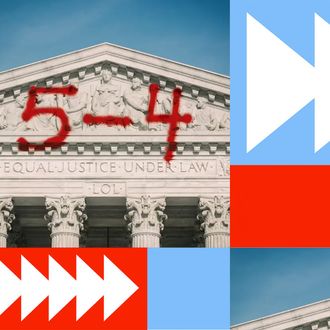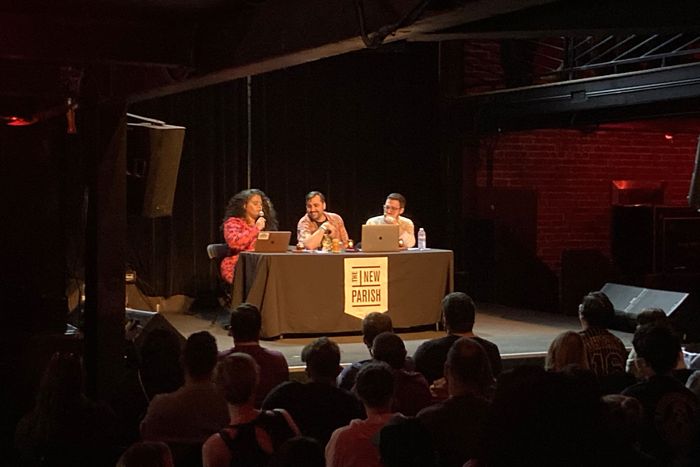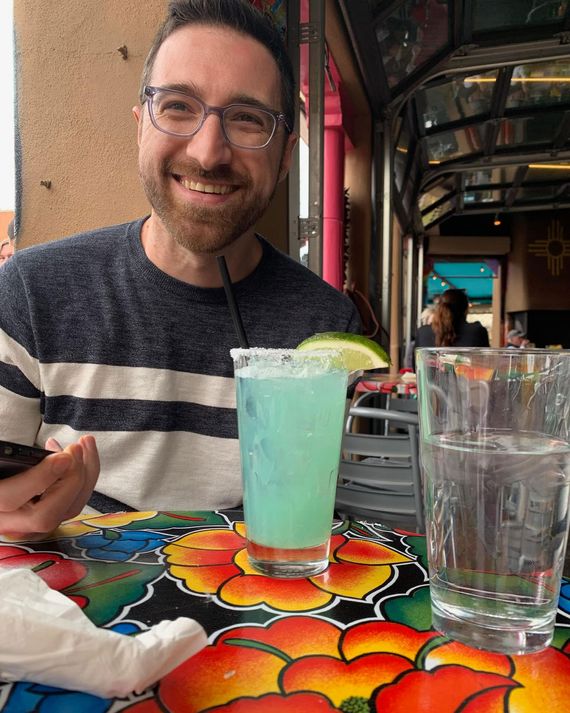
On the official 5-4 website, there is a one-liner that pretty much tells you everything you need to know: “A podcast where we dissect and analyze the Supreme Court cases that have caused America’s lofty promise to fall like a dying satellite slowly crashing back to earth.”
Unlike its buttoned-up peers within the small but mighty subgenre of Supreme Court podcasts (see More Perfect or Slate’s Amicus), the 5-4 hosts make no bones about propriety. Every week, they offer enthusiastically acidic takes on the once-widely revered American legal institution whose legitimacy has grown shakier over the past few years. Except they’ll also tell you that the Supreme Court has always been this questionable, thank you for coming around and seeing that too.
Indeed, a lot of people have been flocking to 5-4’s perspective on the court. Published through Prologue Projects (the studio founded by Fiasco’s Leon Neyfakh and Andrew Parsons), the podcast made its debut back in March 2020, and while it amassed an audience fairly quickly, the show really took off over the past few months in the news-heavy lead-up to the court striking down Roe v. Wade. The New York Times profiled the show in July, where it noted that first-day downloads have more than doubled over the past two years. That attention is also translating into money: The show’s Patreon now has close to 8,000 supporters, many of which are lawyers and law students, earning the production almost $38,000 per month.
The furor around Dobbs is one of the grim reasons for 5-4’s spike in popularity, and the last few weeks saw yet another unfortunate development that’s ultimately to the show’s benefit. In the beginning, the trio of hosts — Rhiannon Hamam, Michael Liroff, and Peter Shamshiri — had operated under semi-anonymity, in part to insulate themselves from professional repercussions. Hamam and Liroff had since gone public about their identities, but on September 23, “Shamshiri,” which was and remains Peter’s pen name, who had been identified on the show and in the press only as “Peter,” lost his job as in-house counsel at Metlife, the insurance company, after his employers learned about the podcast.
How Shamshiri’s superiors came to be aware of 5-4 isn’t entirely clear, though the show’s increasingly public profile almost certainly plays a factor. In any case, the firing opens Shamshiri up to focus on the podcast full time, which was something he was already starting to think about anyway, as he told me last week. He won’t be alone in the pivot. Shortly after we spoke, Hamam posted a Twitter thread announcing that she had stepped away from her job as a public defender. The majority of 5-4’s hosts, then, are now free to double down on the show and their careers as legal commentators.
Could you walk me through what happened over the past few weeks?
So, I was working as in-house counsel for a large Fortune 500 company, and as you might know, I was also hosting a medium-popular podcast–
Well, pretty popular.
I guess? Anyway, at no point has anyone I’ve worked with ever said, “Hey, are you Peter from 5-4?” or anything like that. We had been doing this podcast for two and a half years, and as popular as we might theoretically be, no one has ever identified me at work. It’s just not the demographic.
One day I get pulled into a meeting, and there’s the head of our investigations team at the table with a couple of fancy outside lawyers on a Zoom screen, and they say they wanna talk to me about the 5-4 podcast. What followed was a pretty intensive interrogation where they asked about every detail and paraded all the policies they thought I might be violating in front of me. Then they said, “Okay, we’ll let you know what happens.” Which is standard procedure, by the way. You’ll get interrogated, and there’ll be a period of time that might be a few hours and might be a few weeks, and then someone will let you know either you’re off the hook or you’re being disciplined or whatever.
So I went about my days for a week or so, and one day, I hopped on a Zoom meeting, and they kinda quickly fired me. Employment terminated, nothing much more than that.
What do you think prompted this, and on what specific grounds were you dismissed?
I don’t know exactly how they found out about it. If I had to guess, I would say we were profiled by the Times in July and there was a picture of us in that piece. It’s not the clearest picture of me, though it’s possible someone at work saw that and said, “Hey, that kinda looks like Peter,” and then a chain reaction kicks off. Or it could just be that someone had listened to 5-4 and the same thing happens.
I should preface this by saying companies will give you reasons for termination, but what usually happens (and I’m an employment lawyer, so I have vision into this process) is that there might be three or four grounds to terminate someone, but they’ll go with the strongest one. So it’s not always clear if you’re being terminated for the real reason or just the best reason.
The basic issue, they said, is that I didn’t disclose it to them. I make money off the podcast, and when you make money off something, you’re supposed to disclose it to the company for conflict-of-interest reasons. I hadn’t because, well, at first we weren’t making any money for a long time. They paraded a bunch of other policies in front of me, some I’m familiar with — again, I’m an employment lawyer — but some I’ve never even seen before. One was you have to disclose to the company before you talk to elected officials, and you know, we interviewed Elizabeth Warren and Ro Khanna and Mondaire Jones, and apparently, I was supposed to tell them beforehand. But I was like, “Come on, this isn’t really what this policy is for.”
Anyway, it’s hard to say what their ultimate concern was, but it’s probably some combination of the outside business thing and their instinct that I couldn’t possibly be dedicating my full attention to working here while also having this podcast. (Even though I was doing my work. You wouldn’t have looked at my stuff and thought, I think he’s got another job.) And then there’s the fact you have someone making, uh, politically charged public statements, so maybe someone was like, “There’s some reputational risk here. What if someone thinks we’re somehow affiliated with these opinions?” Which I think is a stupid concern, but it’s one that I could see them having for sure.
I’m curious about anonymity. The podcast had been growing in prominence for a while, and the three of you had been doing some live events. How were you thinking about anonymity through all that?
I mean … it’s interesting because, in the beginning, it was just a little hobby I was dedicating a decent amount of time to. I was having fun with it. The anonymity was because, well, why put your full name on this? Who cares?
Then it got to a point where we actually had to start consciously thinking, What are we doing with anonymity? And I’m not sure if we ever landed somewhere clear. A lot of it was, sure, not wanting my employer to find out, but also, if we got popular enough, I’d rather not receive threats in the mail or whatever happens when you reach a certain level of popularity.
We’d always liked the idea of not tying our personas too much to it. The podcast was conceived as us giving voice to a perspective that wasn’t frequently or clearly expressed, and I really didn’t want it to be a thing where there would be a cult-of-personality aspect to it. When you start slapping your names on things … I don’t wanna say it’s grifty, because it’s not always, but there’s just something about it.
For a while, we wanted to minimize the perception that it was a business. Now, it’s very much the opposite because I very much do need it to be a business. [Laughs.]
Let’s go back to the beginning. How did the podcast come to be and what did you set out to do?
We had a progenitor podcast before: a legal panel show with like 15 people. We had all met on Twitter. It was called Mic Dicta; we put out maybe 20 episodes over the course of eight months in 2018, and it fell apart because, you know, 15 people on a podcast.
Some of us remained friendly, and in early 2019, I was bouncing this podcast idea around but didn’t know how to get it off the ground. I reached out to Rhiannon and Michael, basically saying, “What if we did a Supreme Court podcast one case at a time?” We’d criticize the case and use it as a springboard for criticizing the court more holistically. They said yes, and I’m almost positive it would’ve fizzled out except that Leon Neyfakh reached out to me on Twitter, totally unrelated, and said, “Hey, I like your tweets. Have you ever thought about doing a podcast?”
I didn’t know who he was, so I was like, “Hey, someone just offered to help us with this, and he seems desperate for a podcast ’cuz he’s just reaching out to people on Twitter.” Then one of my friends was like, “Oh, that guy from Slow Burn?” And I was like, “What are you talking about?” So I looked him up and I was like, “Oh, he does podcasts.” We ended up talking to him and launched the show in 2020.
We had this idea that people were reverential toward the Supreme Court, but if they just understood how mediocre and politicized the reasoning was in most cases, it would completely change their view of the court. We had something of a left-leaning perspective, but that’s really all we went into it with. We started with Bush v. Gore because we felt it was the beginning of the modern era of the court, and it evolved as we started talking more about the conservative legal movement, the Federalist Society, and mapping out the ideologies of all these justices.
When did you start feeling 5-4 had legs?
There were a couple of things. When we launched the Patreon in early 2021, we were hoping to get enough money just to sustain the podcast. Instead, all of a sudden, we had a pretty profitable little podcast. A big reason for that was because we had a large number of young lawyers and law students who were very engaged and willing to pay for a Patreon. It’s not Pod Save America level or anything, but that was the first time we realized we had a sizable community of listeners at law schools.
Then, when we had Ro Khanna as our first interview with an elected official, we started getting bites and requests from Capitol Hill to get guest spots on the show. It became very clear we had a lot of congressional staffers and fairly influential media types listening. That was one of the first times I felt we had some level of influence that goes beyond, like, lefty Twitter people looking for another left-leaning podcast.
I think what resonated with people, other than our analysis being accurate, is how we’re very cynical people being cynical at the right time. A lot of people started coming onboard this past term, especially to the idea that we got it right in a lot of ways.
I’ve seen 5-4 described in a bunch of places as a “leftist podcast.” How do you feel about that description?
I don’t really care. Sometimes I feel like I describe myself as left and liberal alternatively depending on which will result in the fewest objections among any given crowd. I don’t wanna sound like one of those people who say, “Oh, I don’t like to label myself politically.” But almost all of my policy views align with people who describe themselves as leftist.
That said, I’m not deep into Marxist theory or anything. Any label I use is one of relative convenience or whatever I think is the most approximate description of where my politics land and who’s gonna agree with me at the end of the day, and I feel the same about the podcast.
As the show grew, did it start crossing your mind that you might want to pivot into the podcast full time?
It wasn’t that I wanted to hold on to the job, it’s just that I didn’t see a way of giving it up while still existing financially. Not for a long time. We were making no money off the podcast at the beginning, but we were so enthralled by the idea that people liked our show that I probably wasn’t concerned enough about someone finding out about it.
When we launched the Patreon, it was a nice supplementary amount of money, but as it grew, I did start thinking about the possibility of living off it, and I also had the thought, What else was out there for me? Eventually, we got to a point over the summer where we were each making enough where I could survive off it. It’s perhaps not the life I was hoping to live, but I could survive. We’re a big show with a lot of people. We’ve got a producer. We’ve got production managers and editorial oversight. People get paid. So in my mind, I thought if I got a little bit closer to six figures, then I would think about switching careers. But then I got pulled aside and, well, got ambushed. In some ways, I was a little unprepared mentally, but I had put just enough thought that once I got past the initial shock, I felt okay.
Right now, I’m in an interesting place. The big picture is that I want to pivot into this in some way. If 5-4 could be expanded into a full-time thing, that’s what I’m gonna try to do, and I honestly think we’re on a trajectory that we want to be on.
The goal for us has always been to point out how the way law professors and legal journalists think about the Supreme Court is stunted. Mainstream media has gotten a little better, a little more accurate, but there’s still a ton of room for us to push there. As more people come around to the way we think about the court, the bigger and more relevant we get, we hope to step in different, more interesting directions away from the Supreme Court. Because we’re not just a podcast about the modern court — we’re about the court and legal institutions from a historical perspective.
Now that you’re able to focus on the podcast full time, what do you think you’ll be able to do that you weren’t able to before?
So because I was an employment lawyer, and because I never wanted to be read as criticizing the company I worked for in case someone was listening, there were times when I pulled some punches or didn’t cover topics about how large companies worked in relation to their employees, for example. I’m excited to talk about topics like that now.
But the big difference is we’re now able to put all our mental energy into it. We can think more creatively about where we want it to go and how to broaden the scope of what we’re doing.
Are you thinking about raising money? Do you have a vision for what 5-4 might look like in a few years?
It’s not so much that I have a specific vision for 5-4 over the next five years than it is a vision for the discourse. I mentioned earlier that we learned from launching the Patreon that we had this huge community of law students, and there’s a lot of promise with that. We went to Berkeley Law earlier this year and something like 75 kids showed up to hear us speak. That’s a huge chunk of their class. We’ve held Zoom events at other schools, and maybe 15 percent of the entire class shows up. Those are crazy numbers when you step back and think about it. My hope is that we are doing something to turn that generation into a group of people that thinks a little more like us and a little less like their law professors.
I mean, we’re a podcast about the Supreme Court. At the end of the day, I don’t think we’re ever going to be a multimillion-dollar enterprise or anything. But if we can influence the current generation of young lawyers and law students to think differently … I think you’ll see that within a few years, if we keep doing what we’re doing.
Do you think you’ll ever go back to the legal profession?
Not anytime soon, in part because I’d have to explain that I got fired from my last job and they’d have to be okay with that. I view this as an opportunity. I’m at a point in my career where I might have the ability to do what I love. I’ve spent way too much of my post-law-school career chasing money and financial stability, and I probably have enough that I can stop worrying, at least for a bit.
Everyone always says, “Do what you love,” and everyone else says, “You can’t always do what you love.” So there are some practical realities to address here, but I feel like I have an opportunity to do this. Also, the thought of getting back up in business casual makes me feel a little ill.
This interview has been edited for length and clarity.




